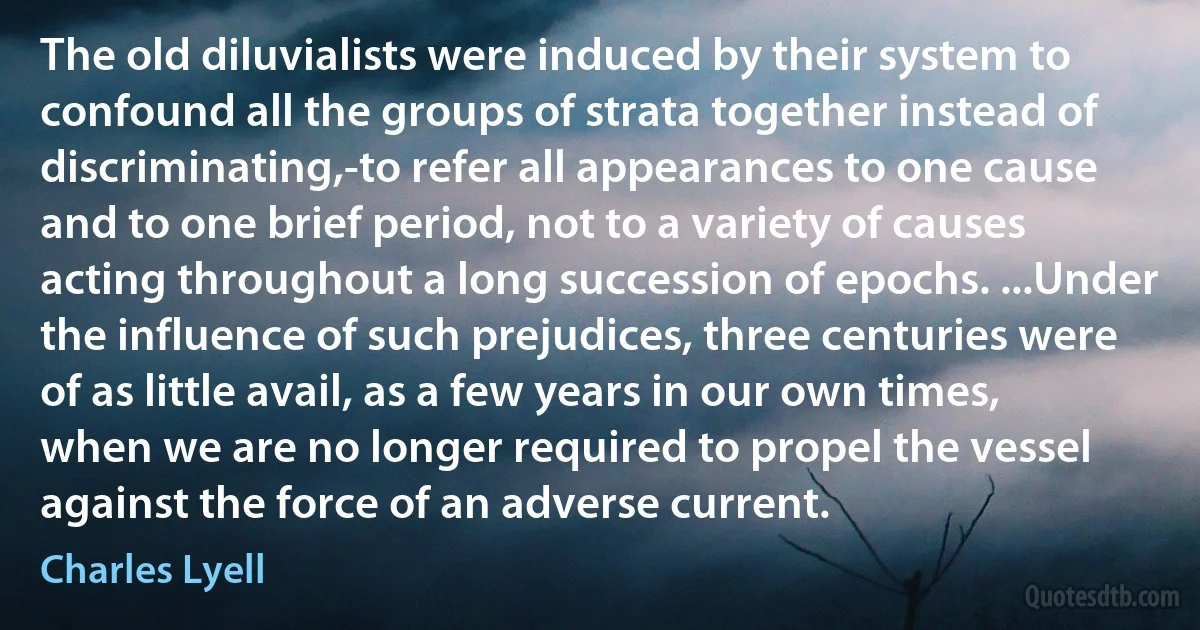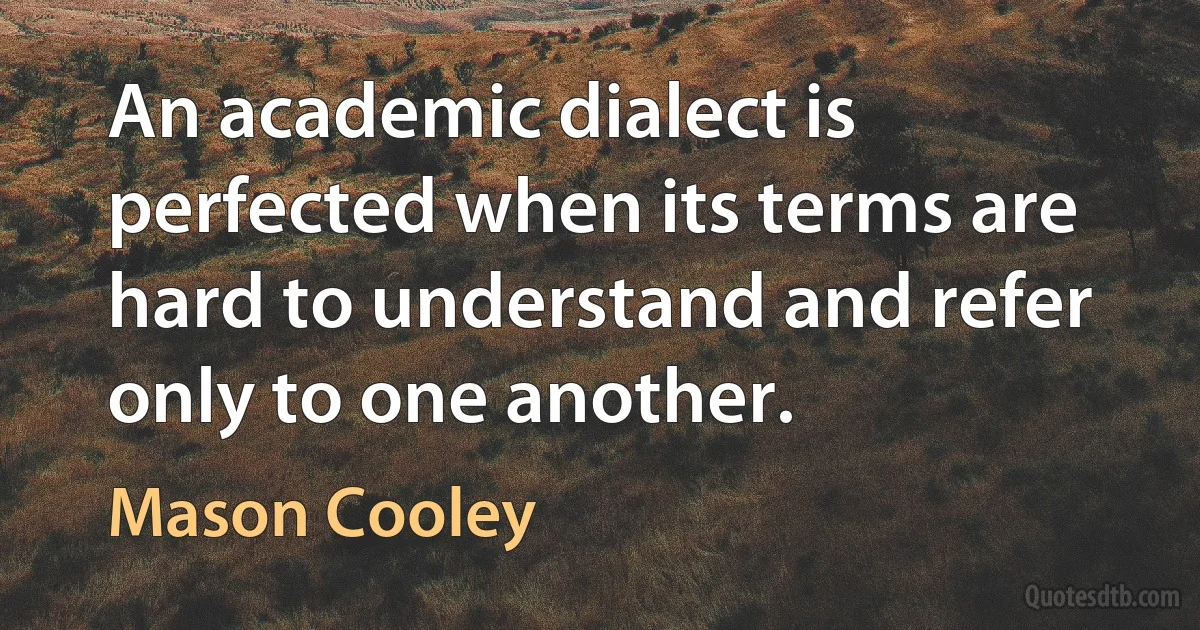Refer Quotes - page 10
The form of a coast, the configuration of the interior of a country, the existence and extent of lakes, valleys, and mountains, can often be traced to the former prevalence of earthquakes and volcanoes in regions which have long been undisturbed. To these remote convulsions the present fertility of some districts the sterile character of others, the elevation of land above the sea, the climate, and various peculiarities, may be distinctly referred.

Charles Lyell
The earliest doctrines of the Indian and Egyptian schools of philosophy agreed in ascribing the first creation of the world to an omnipotent and infinite Being. They concurred also in representing this Being, who had existed from all eternity, as having repeatedly destroyed and reproduced the world and all its inhabitants. ...We have no right to refer to mere chance the prevailing notion that the earth and its inhabitants had formerly undergone a succession of revolutions and catastrophes, interrupted by long intervals of tranquility.

Charles Lyell
Fabio Colonna deserves to be distinguished; for, although he gave way to the dogma that all fossil remains were to be referred to the Noachian deluge, he resisted the absurd theory of Stelluti, who taught that fossil wood and ammonites were mere clay, altered into such forms by sulfurous waters and subterranean heat; and he pointed out the different states of shells buried in the strata, distinguishing between, first, the mere mould or impression; secondly, the cast or nucleus; and thirdly, the remains of the shell itself. He had also the merit of being the first to point out, that some of the fossils had belonged to marine, and some to terrestrial testacea.

Charles Lyell
Cesalpino, a celebrated botanist, conceived that fossil shells had been left on the land by the sea, and had concreted into stone during the consolidation the soil; and in the following year (1597), Simeone Majoli went still farther, and coinciding for the most part with views of Cesalpino, suggested that the shells and matter of the Veronese, and other districts, might have cast up, upon the land, by volcanic explosions, like those gave rise, in 1538, to Monte Nuovo, near Puzzuoli.- This hint was the first imperfect attempt to connect the position fossil shells with the agency of volcanoes, a system more fully developed by Hooke, [Antonio] Lazzaro Moro, Hutton, and other writers. Two years afterwards, Imperati advocated the animal origin of fossilized shells, yet admitted that stones could vegetate by force of 'an internal principle,' and, as evidence of this, he referred to the teeth of fish, and spines of echini found petrified.

Charles Lyell
From the Latin word "imponere", base of the obsolete English "impone" and translated as "impress" in modern English, Nordic hackers have coined the terms "imponator" (a device that does nothing but impress bystanders, referred to as the "imponator effect") and "imponade" (that "goo" that fills you as you get impressed with something - from "marmelade", often referred as "full of imponade", always ironic).

Erik Naggum
"Do you realize,” he asked, "that the whole purpose of civilization is to take the surprises out of life, so one can be bored to death? That a culture in which nothing unexpected ever happens is in what is called its Golden Age? That when nobody can even imagine anything happening unexpectedly, that they later fondly refer to that period as the Good Old Days?”
"I hadn't thought of it in just those words, sir-”
"It is one of the most-avoided facts of life,” said the ambassador. "Government, in the local or planetary sense of the word, is an organization for the suppression of adventure. Taxes are, in part, the insurance premiums one pays for protection against the unpredictable.

Murray Leinster
As Africans, long before the arrival of religion and [the] gospel, we had our own ways of doing things, ... Those were times that the religious people refer to as dark days but we know that, during those times, there were no orphans or old-age homes. Christianity has brought along these things.

Jacob Zuma
Great strategic links are being developed abroad to destroy our Revolution. Those forces are trying to attract all those who have been hurt by the Revolution. We do not refer to the embezzlers, criminals, or the members of the old government; we are thinking of those who have remained on the margin of this revolutionary process, those who have lost economically but support the Revolution in a limited way.

Che Guevara
[H]e was genuinely incapable of uttering a single sentence that was not a cliché.[...] Eichmann, despite his rather bad memory, repeated word for word the same stock phrases and self-invented clichés (when he did succeed in constructing a sentence of his own, he repeated it until it became a cliché) each time he referred to an incident or event of importance to him.[...] The longer one listened to him, the more obvious it became that his inability to speak was closely connected with an inability to think, namely to think from the standpoint of somebody else. No communication was possible with him, not because he lied but because he was surrounded by the most reliable of all safeguards against the words and the presence of others, and hence against reality as such.

Hannah Arendt
In the Platonic dialectic, ... the terms "Being” "Non-being” "Movement,” "the One and the Many” "Identity” and "Contradiction” are methodically kept open, ambiguous, not fully defined. They have an open horizon, an entire universe of meaning which is gradually structured in the process of communication itself, but which is never closed. The propositions are submitted, developed, and tested in a dialogue, in which the partner is led to question the normally unquestioned universe of experience and speech, and to enter a new dimension of discourse - otherwise he is free and the discourse is addressed to his freedom. He is supposed to go beyond that which is given to him - as the speaker, in his proposition, goes beyond the initial setting of the terms. These terms have many meanings because the conditions to which they refer have many sides, implications, and effects which cannot be insulated and stabilized.

Herbert Marcuse
When you think or speak about yourself, when you say, "I,” what you usually refer to is "me and my story.” This is the "I” of your likes and dislikes, fears and desires, the "I” that is never satisfied for long. It is a mind-made sense of who you are, conditioned by the past and seeking to find its fulfillment in the future.

Eckhart Tolle
The "ultimate" questions referred to above do not always come up in the encounter with the shadow. Much more often behind him or her another inner figure emerges as a personification of the unconscious. This takes the form of a woman in a man, and in a woman, that of a man. Often it is they who are at work behind the shadow, throwing up new problems. C. G. Jung called them anima and animus. The anima embodies all feminine psychic qualities in a man-moods, feelings, intuitions, receptivity to the irrational, his personal capacity for love, his sense of nature, and most important of all, his relationship to the unconscious.

Marie-Louise von Franz
And as for the close connection between philosophy and poetry, we can refer to a little-known statement by Thomas Aquinas in his Commentary on Aristotle's Metaphysics [I, 3]: the Philosopher is akin to the Poet in this, that both are concerned with the mirandum, the "wondrous," the astonishing, or whatever calls for astonishment or wonder. This statement is not that easy to fathom, since Thomas, like Aristotle, was a very sober thinker, completely opposed to any Romantic confusion of properly distinct realms. But on the basis of their common orientation towards the "wonderful" (the mirandum - something not to be found in the world of work!) - on this basis, then, of this common transcending-power, the philosophical act is related to the "wonderful," is in fact more closely related to it than to the exact, special sciences; to this point we shall return.

Josef Pieper
The vision we have of conversational programming takes in much more than rapid turn around time and convenient debugging aids: our most interesting programs are never wrong and never final. [...] What is new is the requirement to make variable in our languages what we had previously taken as fixed. I do not refer to new data classes now, but to variables whose values are programs or parts of programs, syntax or parts of syntax, and regimes of control.

Alan Perlis
However far the phenomena transcend the scope of classical physical explanation, the account of all evidence must be expressed in classical terms. The argument is that simply by the word "experiment" we refer to a situation where we can tell others what we have done and what we have learned and that, therefore, the account of the experimental arrangement and of the results of the observations must be expressed in unambiguous language with suitable application of the terminology of classical physics.

Niels Bohr
I wish to come down eighteen hundred years later and refer to a remark made by one of the Latin historians. Some Christians were persecuted in Rome through error, they being 'mistaken for Jews.' The meaning seems plain. These pagans had nothing against Christians, but they were quite ready to persecute Jews. For some reason or other they hated a Jew before they even knew what a Christian was. May I not assume, then, that the persecution of Jews is a thing which antedates Christianity and was not born of Christianity?

Mark Twain
My beliefs are clearly that of a hardened skeptic [...] I use the term "occult" to refer to any of all of these subjects. The reader is forewarned that The Skeptics Dictionary does not try to present a balanced account of occult subjects. If anything, this book is a Davidian counterbalance to the Goliath of occult literature. I hope that an occasional missile hits its mark...

Robert Todd Carroll

![So if I say you that your paintings [which his brother-in-law recently made] have nothing in common with what we see generally classified and accepted, and that you have always managed to produce things that were entirely your own work, as I truly see it, that does not mean you have the right to be seated next to Leonardo -
What's more, this originality is suicidal as it distances you from a 'clientele' used to 'copies of copiers', often referred to as 'tradition'-
One more thing, your technique is not the 'expected' technique – It's your own personal technique, borrowed from nobody – and there again, this doesn't attract the clientele.... In a word, do less self-analysis and enjoy your work without worrying about opinions, your own as well as that of others. (Marcel Duchamp)](https://cdn.quotesdtb.com/img/quotes_images_webp/95/marcel-duchamp-attract-brother-446695.webp)

